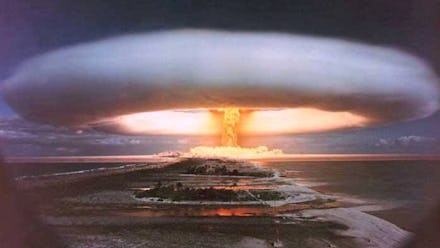North Korea Says It Tested Its First H-Bomb — But Much of the World Is Skeptical

North Korea announced Tuesday it had successfully tested a hydrogen bomb. If true, the claim significantly raises the stakes of the nuclear standoff that has consumed the Korean peninsula since its first preliminary nuclear test roughly a decade ago.
The announcement was made on state television by legendary broadcaster Ri Chun Hee — who came out of retirement for the big news. "The republic's first hydrogen bomb test has been successfully performed at 10:00 am (0130 GMT)," said Ri, according to Yahoo. "We have now joined the rank of advanced nuclear states." Echoing North Korea's longstanding policy, the New York Times reported that Ri brushed aside Washington, D.C.'s demands that the country abandon its nuclear weapons saying it would be "as foolish as for a hunter to lay down his rifle while a ferocious wolf is charging at him."
The announcement was apparently met with celebration by ordinary North Koreans in the country's capital, Pyongyang. "If we didn't have powerful nuclear weapons, we would already have been turned into the slaves of the U.S.," Ri Sol Yong, a 22-year-old university student, told the Associated Press.
Ri's claims came roughly an hour after Western governments detected seismic activity at the Punggye-ri test facility in the northeast region of North Korea. The site has been the location of other nuclear tests in previous years. Unlike the storied atomic bombs of the United States or Soviet Union, all of North Korea's nuclear activity has occurred in secretive underground demonstrations, making it difficult to measure the success or failure of the events. North Korea is believed to have detonated nuclear devices at the area in 2006, 2009 and 2013.
Given the subterranean nature of the event, it is extremely difficult to definitively confirm whether the test took place or if it was as successful as the country is claiming. Almost immediately after the announcement experts began to cast doubt on the nature of North Korea's claims noting the explosive yield of even a failed hydrogen bomb test would be significantly larger than what it appears to have produced.
If the test was a dud, it would mirror North Korea's first attempted nuclear test in 2006, which the country also celebrated but was widely considered by outside observers to be a failure.
As it has in the past, criticism of the test poured in from around the world in the hours after the announcement, including a statement from the National Security Council.
"The test is not only a grave provocation to our national security but also a threat to our future... and a strong challenge to international peace and stability," said South Korean president Park Geun-hye, according to the BBC. Japanese Prime Minister Shinzo Abe agreed. "This clearly violates UN Security Council resolutions and is a grave challenge against international efforts for non-proliferation," he said.
Even China, which for decades has been the North's strongest — and virtually only — ally offered a rebuke. "We strongly urge the DPRK [North Korean] side to remain committed to its denuclearization commitment, and stop taking any actions that would make the situation worse," foreign ministry spokeswoman Hua Chunying said at a press conference.
The UN Security Council is expected to convene an emergency meeting on Wednesday to discuss the latest development on the Korean peninsula, the Associated Press reported. If nothing else the test will re-enforce North Korea's status as a pariah state and deepen already sweeping sanctions against the country. For the duration of his presidency, Barack Obama has refused to accept a nuclear North Korea nor to negotiate with the country until they agreed to abandon their weapons programs — the latest test from the Hermit Kingdom, however, makes that prospect increasingly remote.
Get the five stories that will challenge you to rethink the world by signing up for MicCheck Daily.